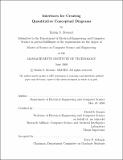Interfaces for creating quantitative conceptual diagrams
Author(s)
Stewart, Robin S. (Robin Scott)
DownloadFull printable version (6.862Mb)
Other Contributors
Massachusetts Institute of Technology. Dept. of Electrical Engineering and Computer Science.
Advisor
David R. Karger and M.C. Schraefel.
Terms of use
Metadata
Show full item recordAbstract
Modern chart-making, illustration, and mathematical tools poorly support the use of conceptual components in quantitative graphs such as Economics diagrams. The substantial time those tools require to achieve the desired results leads many people to sketch their graphs with pencil and paper instead of using a computer. In this thesis, I address the challenge of designing a software user interface that not only includes all features necessary to create a wide range of quantitative conceptual diagrams, but also is dramatically more efficient to use than existing programs. My design takes several important interaction techniques that previous applications used separately and comprehensively integrates them in order to create new, flexible capabilities. I have implemented this design as a desktop application called Graph Sketcher, and I present results of studies which show that my interface halves the time required to complete several common graph creation tasks. I also show that the 700 students, teachers, professionals, and hobbyists worldwide who choose to use Graph Sketcher in their everyday work nd the interface intuitive, enjoyable, and empowering for generating many different types of graphs.
Description
Thesis (S.M.)--Massachusetts Institute of Technology, Dept. of Electrical Engineering and Computer Science, 2008. This electronic version was submitted by the student author. The certified thesis is available in the Institute Archives and Special Collections. Includes bibliographical references (p. 71-73).
Date issued
2008Department
Massachusetts Institute of Technology. Department of Electrical Engineering and Computer SciencePublisher
Massachusetts Institute of Technology
Keywords
Electrical Engineering and Computer Science.